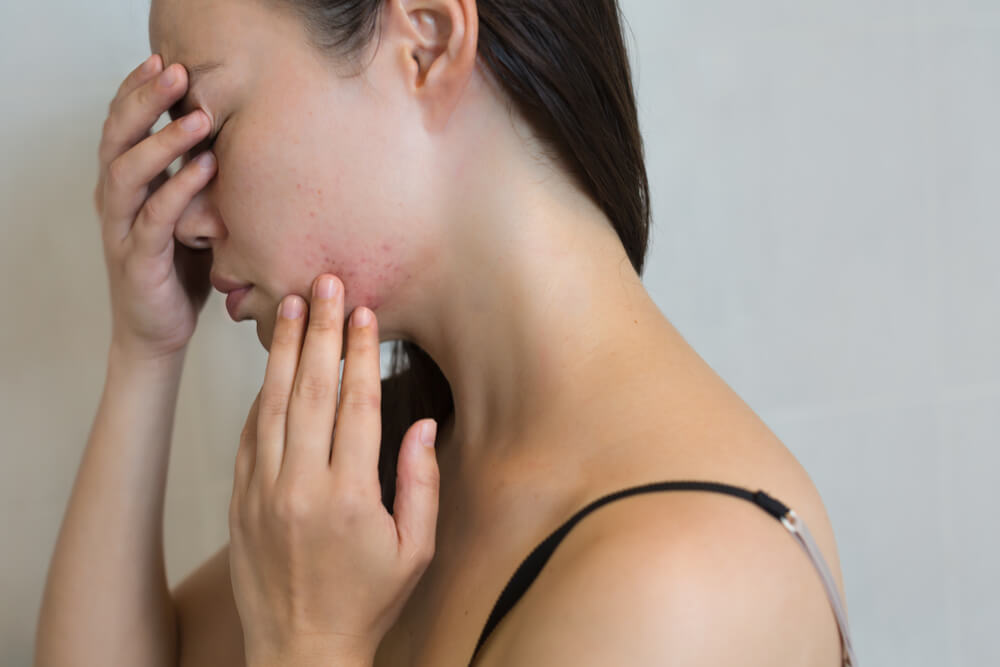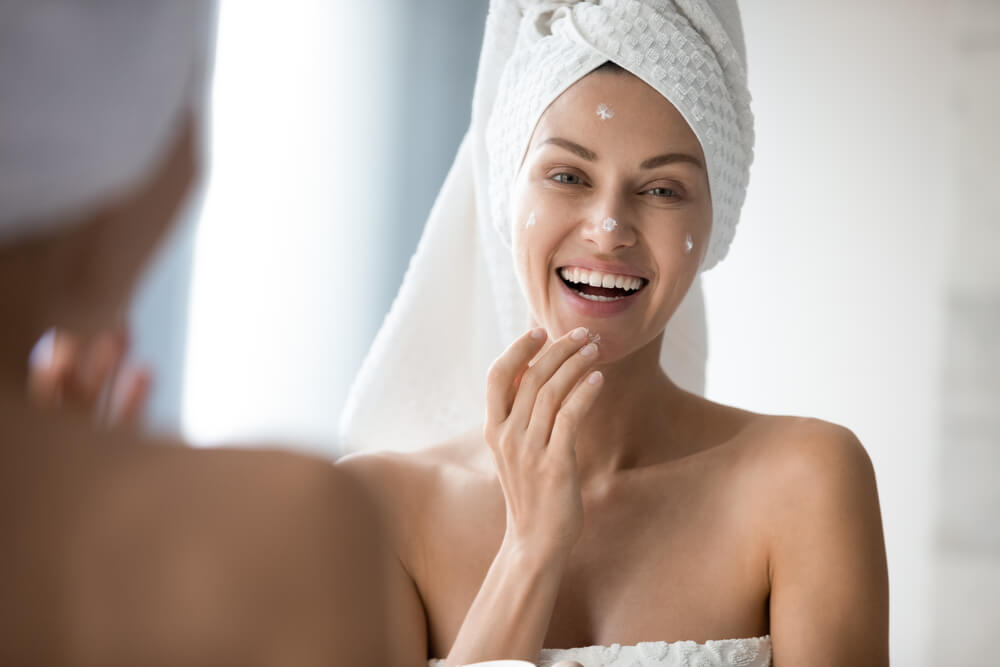Bringing a new life into the world is a miraculous journey, but for many new mothers, the postpartum period comes with unexpected challenges, including the unwelcome companion of acne after pregnancy. This article aims to shed light on the causes and treatments of postpartum acne, commonly referred to as postpartum hormonal acne or postpartum breakouts. Postpartum skincare can be quite challenging so today we will be exploring the unique factors contributing to this skin condition and discovering effective strategies to regain clear and glowing skin while navigating the beautiful chaos of motherhood.
Experts at University Park OBGYN offer counseling and support to new mothers who are struggling with their skin after giving birth, because it is crucial to take care of every single aspect of the body after delivery. Skin, hair, sleep, nutrition, etc. are all important parts of the overall health of new mothers, and supporting them reach their goals is what this clinic and its staff is all about.
Acne After Pregnancy 101

Acne after pregnancy, often coined postpartum acne, can be a perplexing challenge for new mothers. Hormonal shifts, stress, and breastfeeding intricacies play pivotal roles. Understanding this postpartum skincare 101 is essential.
Hormonal fluctuations, especially the rise in androgen hormones, can increase sebum production, leading to clogged pores and breakouts. Stress amplifies these hormonal imbalances, while breastfeeding can introduce its unique complexities.
By embracing a gentle skincare routine, exploring topical treatments cautiously, considering hormonal therapy under professional guidance, and prioritizing hydration and nutrition, new mothers can confidently navigate the journey to clear, radiant skin amid the joys of motherhood.
Causes of Postpartum Acne
As mentioned previously, there can be various reasons why you are facing postpartum breakouts, but here are some of them in more detail, so the biology behind it is more clear:
- Hormonal Fluctuations: One of the key orchestrators behind postpartum acne is the intricate dance of hormonal fluctuations that follows childbirth. Estrogen levels take a dip while androgen hormones, particularly testosterone, may surge. This hormonal imbalance triggers a cascade effect on the skin, prompting sebaceous glands to ramp up oil production.
The excess oil, when combined with the natural shedding of skin cells, creates a fertile ground for the formation of acne. Understanding this hormonal symphony is crucial in addressing postpartum hormonal acne. While it is a natural part of the postpartum journey, adopting targeted skincare routines and seeking professional advice can help harmonize these hormonal fluctuations, paving the way for clear and radiant skin.
- Stress: The postpartum period, though joyous, often introduces a wave of stress for new mothers. Stress, both physical and emotional, can significantly influence the development of postpartum breakouts. When stress levels soar, the body responds by releasing cortisol, a hormone known to stimulate oil production in the skin. In the context of postpartum hormonal shifts, elevated stress can exacerbate hormonal imbalances, further contributing to acne breakouts.
Managing stress becomes a pivotal aspect of postpartum skincare. Incorporating mindfulness techniques, such as meditation or deep breathing exercises, can help regulate stress hormones, promoting not only mental well-being but also clearer skin. By acknowledging and addressing stress as a crucial factor, new mothers can empower themselves on the journey to achieving a harmonious balance between maternal bliss and skin health.
- Breastfeeding: For many new mothers, the symbiotic relationship between breastfeeding and breastfeeding acne adds an additional layer of complexity to skincare. While breastfeeding offers numerous health benefits for both mother and baby, it can influence hormone levels in ways that impact the skin. The act of lactation often leads to fluctuations in prolactin and oxytocin, which, in turn, may influence androgen hormones.
This hormonal interplay can contribute to the development of acne lesions. Balancing the nutritional benefits of breastfeeding with the management of postpartum acne requires a nuanced approach. Consulting with healthcare professionals is essential to tailor skincare routines that address acne concerns while ensuring the well-being of both the mother and the nursing infant.
Treatments for Postpartum Acne

Treatment options are various, depending on factors such as the mother’s age, skin type, routine, lifestyle, etc. Here are some of the most recommended ones:
- Gentle Skincare Routine: Amidst the whirlwind of postpartum adjustments, adopting a gentle skincare routine emerges as a cornerstone in managing acne after pregnancy. The skin undergoes significant transformations, and a gentle approach ensures a delicate balance between effective care and avoiding unnecessary irritation.
Opting for mild, fragrance-free cleansers and moisturizers becomes paramount, safeguarding the skin’s natural barrier. Non-comedogenic products, specifically formulated to prevent pore clogging, play a crucial role in mitigating postpartum breakouts. This gentle skincare ritual extends beyond cleansers, incorporating soothing ingredients like chamomile or aloe vera.
- Topical Treatments: In the arsenal against postpartum acne, topical treatments stand out as precision tools, targeting acne lesions directly. Ingredients like benzoyl peroxide and salicylic acid play pivotal roles in controlling postpartum breakouts by unclogging pores and reducing inflammation.
However, a cautious approach is crucial, especially for breastfeeding mothers, as certain ingredients may pose risks to the nursing infant. Consulting with a healthcare professional becomes paramount to ensure the safety and efficacy of topical treatments.
Precision in application, focusing on affected areas without over-application, prevents potential irritation. The careful integration of topical treatments into a comprehensive postpartum skincare routine empowers new mothers to address acne concerns effectively while maintaining the delicate balance necessary for their evolving skin.
- Hormonal Therapy: For severe cases of postpartum hormonal acne, hormonal therapy may be considered under the guidance of a healthcare provider. Prescription medications, such as oral contraceptives or hormonal medications, can help regulate hormone levels and reduce the occurrence of acne breakouts.
- Hydration and Nutrition: Maintaining proper hydration and a balanced diet can contribute significantly to skin health. Drinking an adequate amount of water supports overall skin function, while a diet rich in fruits, vegetables, and antioxidants provides essential nutrients for skin repair and regeneration.
To Conclude…
Motherhood brings a lot of joy, but also a significant amount of stress. Dealing with postpartum acne can be challenging, but understanding the causes and implementing effective treatments can make a significant difference. Postpartum hormonal acne, postpartum breakouts, and breastfeeding acne are all part of the broader landscape of postpartum skincare.
By adopting a holistic approach that encompasses gentle skincare, targeted treatments, stress management, and a healthy lifestyle, new mothers can regain confidence in their skin while savoring the joys of motherhood. Remember, a clear path to radiant skin is within reach with the right knowledge and care.
Visit Us!
The team at the University Park OBGYN is always at your disposal. We are here to try and help you as much as possible with postpartum acne or any other issue or concern you might have. Dealing with anything besides your newborn baby is stressful, especially when it is a condition such as acne. Follow our advice and call us, let us help you the best we can. A stress-free motherhood is our priority.


